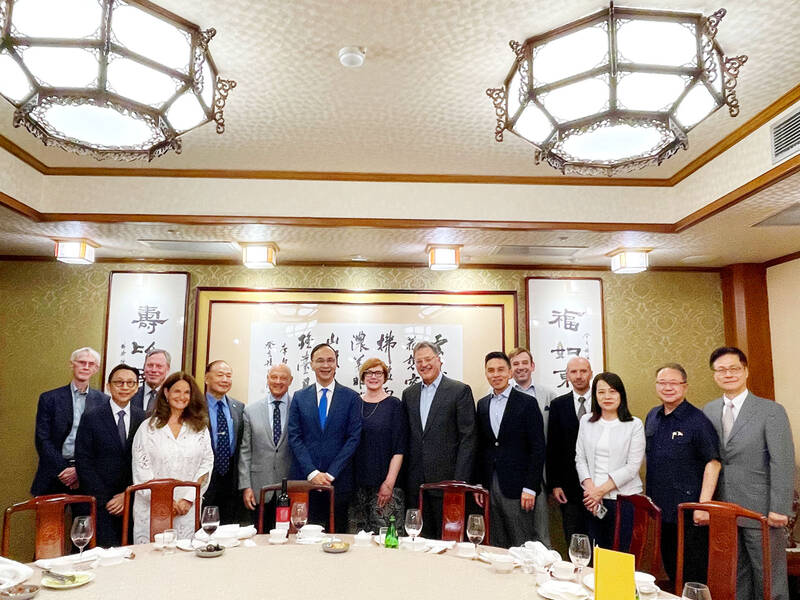In the aftermath of the 2020 general elections the Chinese Nationalist Party (KMT) was demoralized. The Democratic Progressive Party (DPP) had crushed them in a second landslide in a row, with their presidential candidate Tsai Ing-wen (蔡英文) winning more votes than any in Taiwan’s history. The KMT did pick up three legislative seats, but the DPP retained an outright majority.
To take responsibility for that catastrophic loss, as is customary, party chairman Wu Den-yih (吳敦義) resigned. This would mark the end of an era of how the party operated and the beginning of a new effort at reform, first under Johnny Chiang (江啟臣) then under Eric Chu (朱立倫).
The KMT was well aware of the problems they faced. Following the 2014 Sunflower movement the center of mainstream public opinion moved toward the moderate position of the DPP. The party was hidebound and Leninist in structure and largely favored men whose families had fled the Chinese Civil War in or around 1949 — but they only represent roughly 15 percent of the population.

Photo courtesy of the Chinese Nationalist Party
The party, once billed as the world’s wealthiest, was also in desperate financial straits following the passing of the Act Governing the Settlement of Ill-gotten Properties by Political Parties and Their Affiliate Organizations (政黨及其附隨組織不當取得財產處理條例), which stripped it of the assets it had seized during the one-party state authoritarian era.
The relatively youthful and moderate Chiang ran to replace Wu, and won. During his campaign, he frequently mentioned that only 2.5 percent of party members were under the age of 40.
Chiang had some successes, but as merely a caretaker seeing out the little over one year left on Wu’s term, he did not have the heft to make major changes. His most bold attempt was to try and get the party to drop the deeply unpopular “1992 consensus,” which refers to a tacit understanding between the KMT and the Chinese Communist Party (CCP) that both sides of the Taiwan Strait acknowledge that there is “one China,” with each side having its own interpretation of what “China” means.

Photo: Tien Yu-hua, Taipei Times
At the last minute, however, he pulled it from the party congress vote, almost certainly under pressure from the old guard led by former president Ma Ying-jeou (馬英九). In September of 2021, Chiang lost the chairmanship to Chu.
CHU’S WEAK START
Chu was a curious choice to run the party and lead the reform effort, which was reflected in the vote. He only won with a plurality of 46 percent in a four-way race, and had to fend off an insurgent challenge by the pro-China Chang Ya-chung (張亞中), who managed to capture one-third of the vote and push Chiang into third place.
Chu had been the party chairman during the first disastrous landslide defeat for the KMT in 2015-2016, and resigned to take responsibility. However, everyone knew the KMT was going to get crushed — the question was how bad?
Chu did everything he could to get out of running for president in spite of it still being customary at the time for the party chair to be the candidate. In the end he bowed to pressure when it became clear that the party’s candidate, Hung Hsiu-chu (洪秀柱), was catastrophically bad, and Chu was put in to replace her. It didn’t, however, change the result of the election.
By 2021, at least a plurality recognized that the 2016 loss was not Chu’s fault. However, his poor turnout meant he started off weak.
Things went from bad to worse for Chu, losing four referendums soon after taking office, a runoff election and a failed recall attempt against lawmaker Freddy Lim (林昶佐) that the KMT had supported, though Chu had only been in office for a couple of weeks. After this string of defeats and heading into an election year, calls for Chu to resign started to ring out, though party elders like Ma continued to back him. It also helped that the most popular politician in the country, New Taipei Mayor Hou You-yi (侯友宜), was Chu’s protege, having been brought into politics from law enforcement by Chu and appointed one of his deputy mayors.
CHU’S BOLD AND RISKY MOVES THAT PAID OFF
In the 2022 local elections, Chu employed three new strategies. For city and county council primaries, he handicapped candidates over 40 to encourage more young candidates. Of course, older potential candidates were furious and there was talk of internal revolt.
His second move was to handpick the candidates for mayors and county commissioners, only allowing the candidates for Nantou County commissioner a primary. Again, this alienated a lot of powerful people in the party.
His third move was to appoint women as 10 of the party’s 22 candidates for regional leader, and to lean into this heavily in campaign promotions. The DPP only appointed five.
In the end his strategies worked and the DPP was handed their worst result ever in local elections for regional leaders, but they did gain city and county council seats. Though the KMT did not add to their total count, they traded wins in big places like Taipei City and Taoyuan for smaller losses in Miaoli and Hsinchu City.
In this election two-thirds of female candidates won versus only half for male candidates, a trend that apparently Chu had noticed developing in recent years, but curiously Tsai Ing-wen did not.
Last year Chu again faced outright revolt among elements of the KMT when he handpicked Hou as the party’s presidential candidate and rejected Hon Hai Precision Industry Co founder Terry Gou (郭台銘), yet when it came time to formally nominate Hou at the party congress the revolt evaporated. Though Hou did not win the presidential election, his result was respectable and Chu was proven right about Gou, whose independent campaign sank in the polls and he soon exited the race.
Similarly, though the party did not win a majority in the legislature, it did win a plurality and became the most powerful party caucus. The DPP lost their majority and became a minority party, losing the speaker position as a result.
CHU’S POTENTIAL CHALLENGERS
Though Chu has been taking bold steps to staunch the party’s dire financial losses and bring in more youth — and he has had some success with both — the next KMT chair, to be elected in September of next year, will almost certainly continue to face these issues.
Speculation on who will run for the post is already intense. It is widely assumed Chu will run again, with Taichung Mayor Lu Shiow-yen (盧秀燕) and Hou You-yi considered the top two potential challengers.
Both Lu and Hou will be term-limited out of their mayoral jobs just over a year after the KMT chair election, so one argument against both is having to do two jobs at once.
Lu is widely considered the party’s likely presidential candidate in the 2028 race and some argue that the presidential candidate running the party would consolidate strengths. Others argue that it would instead be a distraction.
Despite some setbacks, overall he has a respectively strong case to make for why he should be re-elected, especially if he can make good progress on solving the financial and youth problems by then.
Donovan’s Deep Dives is a regular column by Courtney Donovan Smith (石東文) who writes in-depth analysis on everything about Taiwan’s political scene and geopolitics. Donovan is also the central Taiwan correspondent at ICRT FM100 Radio News, co-publisher of Compass Magazine, co-founder Taiwan Report (report.tw) and former chair of the Taichung American Chamber of Commerce. Follow him on X: @donovan_smith.

This is the year that the demographic crisis will begin to impact people’s lives. This will create pressures on treatment and hiring of foreigners. Regardless of whatever technological breakthroughs happen, the real value will come from digesting and productively applying existing technologies in new and creative ways. INTRODUCING BASIC SERVICES BREAKDOWNS At some point soon, we will begin to witness a breakdown in basic services. Initially, it will be limited and sporadic, but the frequency and newsworthiness of the incidents will only continue to accelerate dramatically in the coming years. Here in central Taiwan, many basic services are severely understaffed, and

Jan. 5 to Jan. 11 Of the more than 3,000km of sugar railway that once criss-crossed central and southern Taiwan, just 16.1km remain in operation today. By the time Dafydd Fell began photographing the network in earnest in 1994, it was already well past its heyday. The system had been significantly cut back, leaving behind abandoned stations, rusting rolling stock and crumbling facilities. This reduction continued during the five years of his documentation, adding urgency to his task. As passenger services had already ceased by then, Fell had to wait for the sugarcane harvest season each year, which typically ran from

It is a soulful folk song, filled with feeling and history: A love-stricken young man tells God about his hopes and dreams of happiness. Generations of Uighurs, the Turkic ethnic minority in China’s Xinjiang region, have played it at parties and weddings. But today, if they download it, play it or share it online, they risk ending up in prison. Besh pede, a popular Uighur folk ballad, is among dozens of Uighur-language songs that have been deemed “problematic” by Xinjiang authorities, according to a recording of a meeting held by police and other local officials in the historic city of Kashgar in

The People’s Republic of China (PRC) was out in force in the Taiwan Strait this week, threatening Taiwan with live-fire exercises, aircraft incursions and tedious claims to ownership. The reaction to the PRC’s blockade and decapitation strike exercises offer numerous lessons, if only we are willing to be taught. Reading the commentary on PRC behavior is like reading Bible interpretation across a range of Christian denominations: the text is recast to mean what the interpreter wants it to mean. Many PRC believers contended that the drills, obviously scheduled in advance, were aimed at the recent arms offer to Taiwan by the